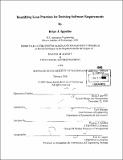Identifying lean practices for deriving software requirements
Author(s)
Ippolito, Brian J. (Brian James), 1970-
DownloadFull printable version (18.00Mb)
Other Contributors
System Design and Management Program.
Advisor
Earll Murman.
Terms of use
Metadata
Show full item recordAbstract
Lean principles focus on employing value added activities to reduce product development cycle time, increase quality, and reduce cost. Lean originated in the automotive industry and has since been centered in the manufacturing domain. Lessons learned on implementing Lean initiatives have been captured by the in the Lean Aerospace Initiative (LAI) and incorporated into the Lean Enterprise Model (LEM) (http://lean.mit.edu/public/index.html). To the author's knowledge, this is the first research effort specifically designed to apply the Lean principles and the Lean Enterprise Model to the aerospace software requirement derivation process. Data supporting this research is the result of a comprehensive two-year research effort involving three detailed case studies with 45 case study interviews, 125 stakeholder surveys collected from ten aerospace software upgrades, feedback from numerous aerospace industry practitioners and Massachusetts Institute of technology (MIT) faculty. Ten aerospace software upgrades were analyzed at both an enterprise level and an organizational level to identify the presence of Lean practices. At the enterprise level, metrics typically used to measure enterprise performance (Flow Time, Stakeholder Satisfaction, Quality Yield, and Resource Utilization) were found to be appropriate for the software requirement process but not adequately implemented. An organizational analysis observed five of the twelve Lean practices as effectively implemented and identified opportunities to implement four more Lean practices.
Description
Thesis (S.M.)--Massachusetts Institute of Technology, System Design & Management Program, 2000. Includes bibliographical references (p. 133-134).
Date issued
2000Department
System Design and Management Program.Publisher
Massachusetts Institute of Technology
Keywords
System Design and Management Program.